初高中英语衔接教学专题之英语句子成分(共33张PPT)
文档属性
| 名称 | 初高中英语衔接教学专题之英语句子成分(共33张PPT) |

|
|
| 格式 | zip | ||
| 文件大小 | 823.5KB | ||
| 资源类型 | 教案 | ||
| 版本资源 | 人教版(新课程标准) | ||
| 科目 | 英语 | ||
| 更新时间 | 2020-03-18 00:00:00 | ||
图片预览

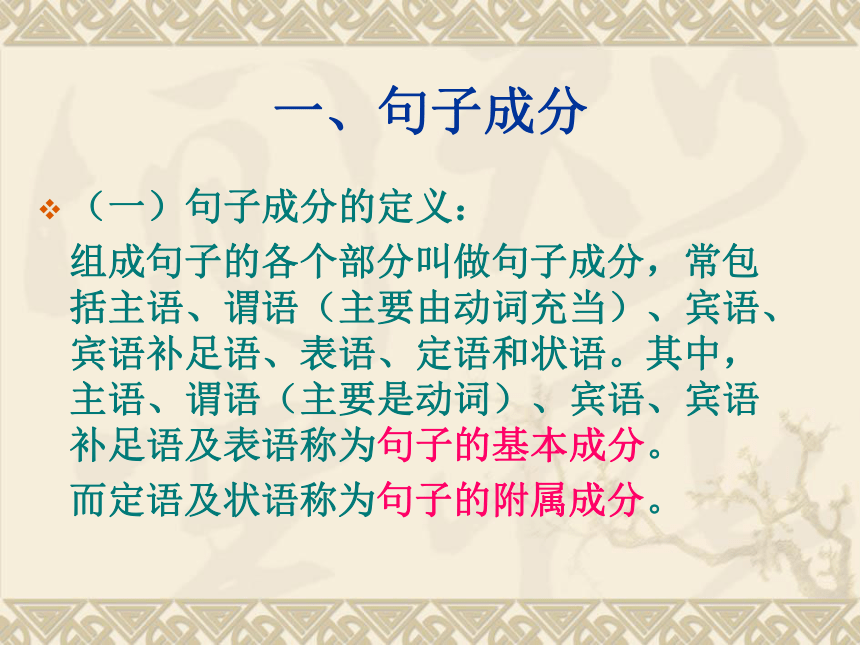
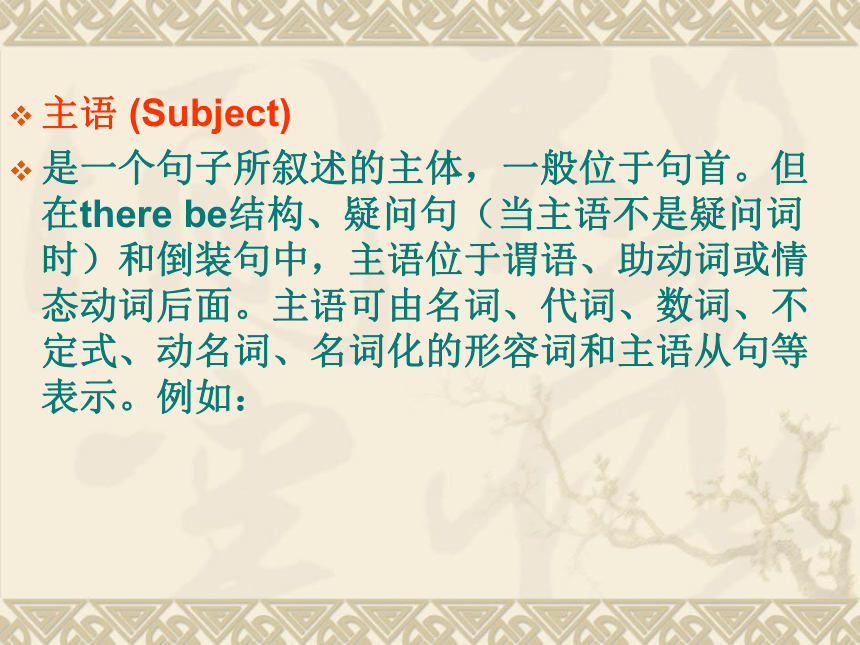

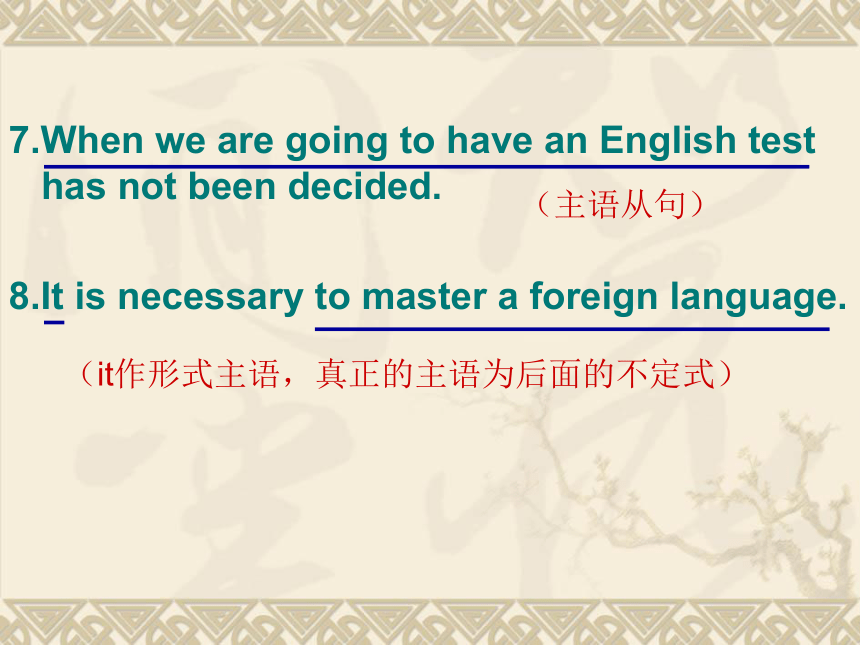
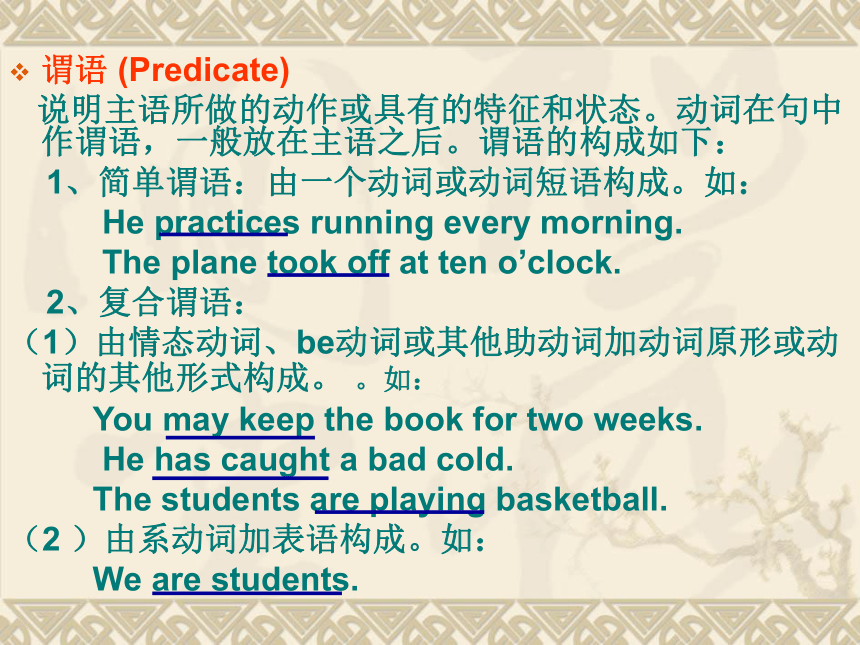
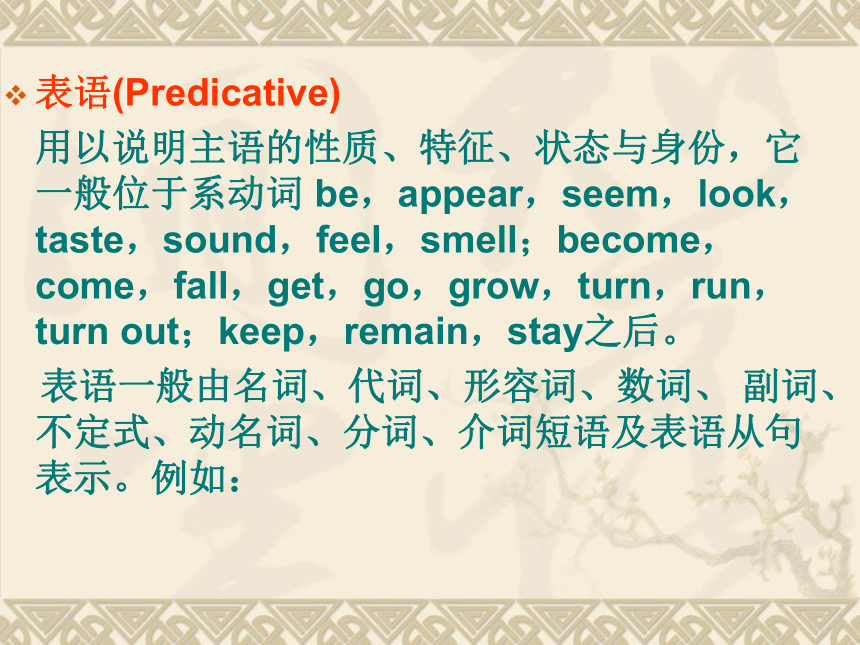
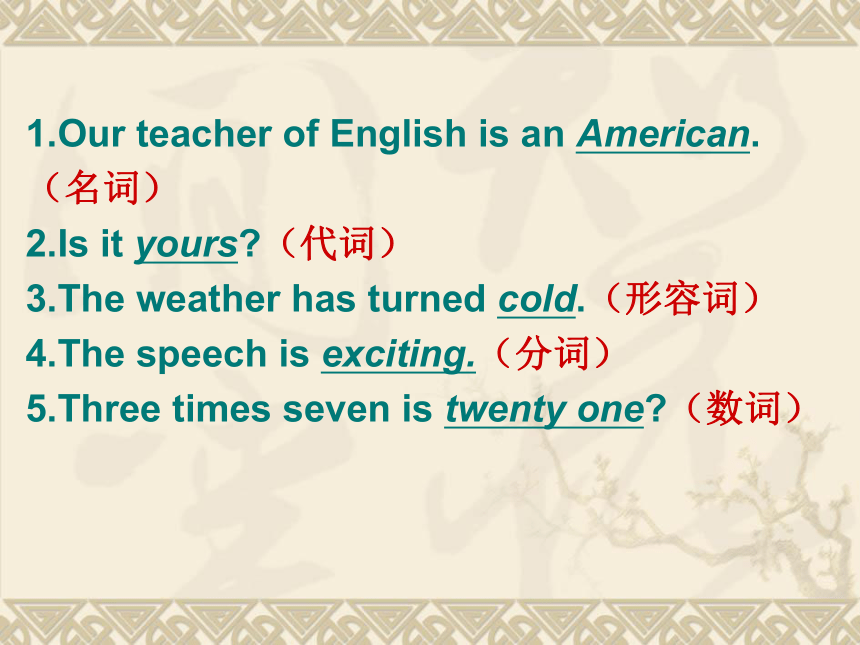
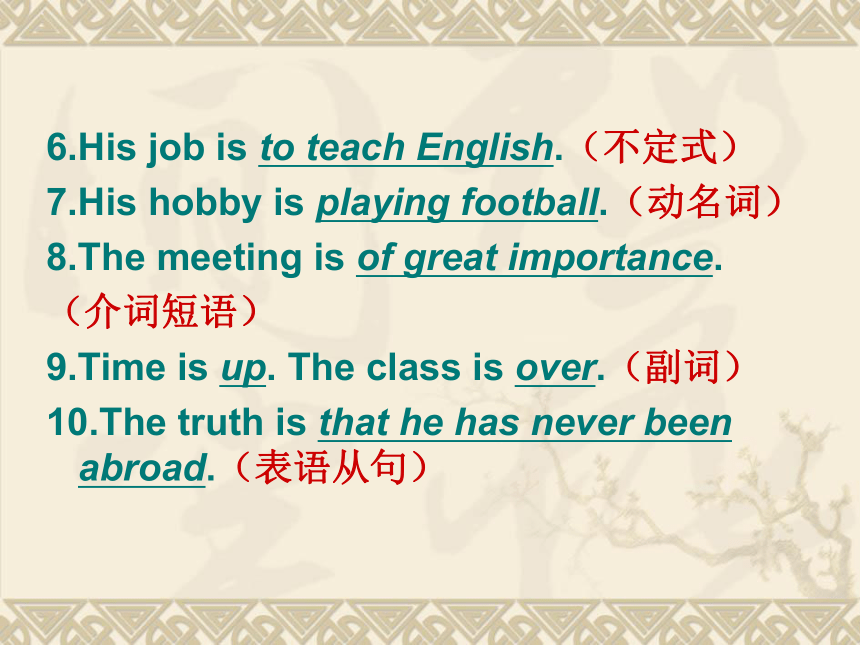
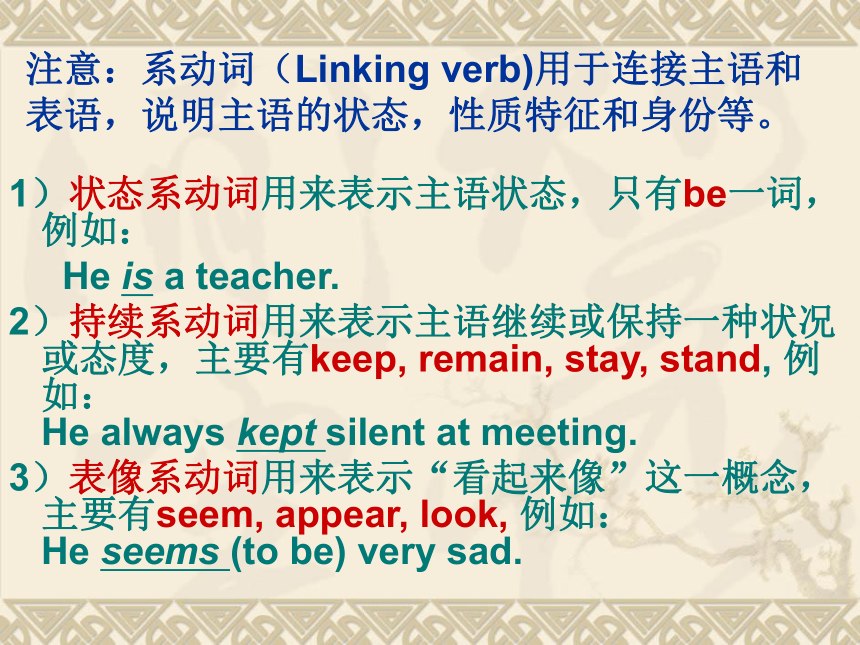

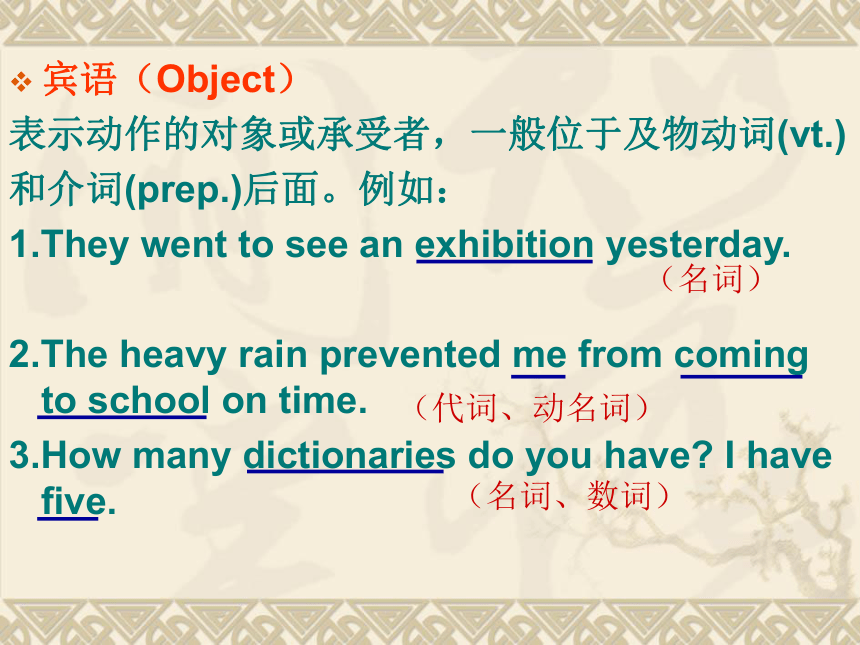
文档简介
(共39张PPT)
初高中英语衔接教学专题之
一、句子成分
(一)句子成分的定义:
组成句子的各个部分叫做句子成分,常包括主语、谓语(主要由动词充当)、宾语、宾语补足语、表语、定语和状语。其中,主语、谓语(主要是动词)、宾语、宾语补足语及表语称为句子的基本成分。
而定语及状语称为句子的附属成分。
主语 (Subject)
是一个句子所叙述的主体,一般位于句首。但在there be结构、疑问句(当主语不是疑问词时)和倒装句中,主语位于谓语、助动词或情态动词后面。主语可由名词、代词、数词、不定式、动名词、名词化的形容词和主语从句等表示。例如:
1.During the 1990s, American country music has become more and more popular.
2.We often speak English in class.
3.One-third of the students in this class are girls.
4.To swim in the river is a great pleasure.
5.Smoking does harm to the health.
6.The rich should help the poor.
(名词)
(代词)
(数词)
(不定式)
(动名词)
(名词化的形容词)
7.When we are going to have an English test has not been decided.
8.It is necessary to master a foreign language.
(主语从句)
(it作形式主语,真正的主语为后面的不定式)
谓语 (Predicate)
说明主语所做的动作或具有的特征和状态。动词在句中作谓语,一般放在主语之后。谓语的构成如下:
1、简单谓语:由一个动词或动词短语构成。如:
He practices running every morning.
The plane took off at ten o’clock.
2、复合谓语:
(1)由情态动词、be动词或其他助动词加动词原形或动词的其他形式构成。 。如:
You may keep the book for two weeks.
He has caught a bad cold.
The students are playing basketball.
(2 )由系动词加表语构成。如:
We are students.
表语(Predicative)
用以说明主语的性质、特征、状态与身份,它一般位于系动词 be,appear,seem,look, taste,sound,feel,smell;become, come,fall,get,go,grow,turn,run,turn out;keep,remain,stay之后。
表语一般由名词、代词、形容词、数词、 副词、不定式、动名词、分词、介词短语及表语从句表示。例如:
1.Our teacher of English is an American.
(名词)
2.Is it yours?(代词)
3.The weather has turned cold.(形容词)
4.The speech is exciting.(分词)
5.Three times seven is twenty one?(数词)
6.His job is to teach English.(不定式)
7.His hobby is playing football.(动名词)
8.The meeting is of great importance.
(介词短语)
9.Time is up. The class is over.(副词)
10.The truth is that he has never been abroad.(表语从句)
注意:系动词(Linking verb)用于连接主语和表语,说明主语的状态,性质特征和身份等。
1)状态系动词用来表示主语状态,只有be一词,例如:
He is a teacher.
2)持续系动词用来表示主语继续或保持一种状况或态度,主要有keep, remain, stay, stand, 例如: He always kept silent at meeting.?
3)表像系动词用来表示“看起来像”这一概念,主要有seem, appear, look, 例如: He seems (to be) very sad.??
注意:系动词(Linking verb)用于连接主语和表语,说明主语的状态,性质特征和身份等。
?
4)感官系动词主要有feel, smell, sound, taste, 例如: This kind of cloth feels very soft.
5)变化系动词表示主语变成什么样,主要有become, grow, turn, fall, get, go, come, run.例如: He became mad after that.??
6)终止系动词表示主语已终止动作,主要有prove, turn out, 表达“被证实”,“结果是"之意,例如: The rumor proved false.
His plan turned out a success.??
宾语(Object)
表示动作的对象或承受者,一般位于及物动词(vt.)
和介词(prep.)后面。例如:
1.They went to see an exhibition yesterday.
2.The heavy rain prevented me from coming to school on time.
3.How many dictionaries do you have? I have five.
(名词)
(代词、动名词)
(名词、数词)
4.They helped the old with their housework yesterday.
5.He pretended not to see me.
6.I enjoy listening to popular music.
7.I think(that)he is fit for his office.
(名词化形容词,名词)
(不定式短语)
(动名词短语)
(宾语从句)
宾语种类:
(1)双宾语(间接宾语+直接宾语),例如:Lend me your dictionary, please.
To: write, tell, pass, give, send, promise, show, hand, read, tell, bring, throw等,例如:
He sent the novel to William yesterday.
For: leave, buy, build, choose, cook, draw, find, get, order, post, save等,例如:
She bought a gift for her mother.
(2)复合宾语(宾语+宾补),例如:
They elected him their monitor.
宾语补足语(Object Complement)
英语中有些及物动词,除有一个直接宾语以外,
还要有一个宾语补足语,才能使句子的意义完整。
带有宾语补足语的一般句型为:某些及物动词
(如make等+宾语+宾补)。宾补可由名词、形容
词、副词、不定式、分词、介词短语和从句充当。
例如:
1.His father named him Dongming.
2.They painted their boat white.
3.Let the fresh air in.
4.You mustn’t force him to lend his money to you.
5.We saw her entering the room.
6.We found everything in the lab in good order.
7.We will soon make our city what your city is now.
(名词)
(形容词)
(副词)
(不定式短语)
(现在分词)
(介词短语)
(从句)
定语(Attribute)
定语起修饰限制名词或代词的作用,可分为前
置定语和后置定语。一般由形容词性物主代词、
数词、形容词、介词短语、动词不定式、分词
(短语)或句子充当。例如:
1.Guilin is a beautiful city.(形容词)
2.China is a developing country; America is a developed country.(分词)
3.There are thirty women teachers in our school. (名词)
4.His rapid progress in English made us surprised.(形容词性物主代词)
5.Our monitor is always the first to enter the classroom.
(不定式短语)
6.The teaching plan for next term has been worked out.
(动名词)
7.He is reading an article about how to learn English.
(介词短语)
8.Farmers who saw us stared at us as if we are walking skeletons.
(定语从句)
状语(Adverbial)。
状语用于修饰动词、形容词、副词或整个句子,说明动作或状态特征。可表示时间、地点、原因、目的、结果、方式、伴随、条件、程度、让步、频率等。
1.Light travels most quickly.
2.He has lived in the city for ten years.
3.He is proud to have passed the national college entrance examination.
(副词及副词性词组)
(介词短语)
(不定式短语)
4.He is in the room making a model plane.
5.Wait a minute.
6.Once you begin, you must continue.
(分词短语)
(名词)
(状语从句)
9种状语种类如下:
1. How about meeting again at six?
2. Last night she didn’t go to the dance party because of the rain.
3.I shall go there if it doesn’t rain.
4.Mr Smith lives on the third floor.
5.She put the eggs into the basket with great care.
(时间状语)
(原因状语)
(条件状语)
(地点状语)
(方式状语)
She came in with a dictionary in her hand.
6.In order to catch up with the others, I must work harder.
7.He was so tired that he fell asleep immediately.
8.She works very hard though she is old.
9.I am taller than he is.
(伴随状语)
(目的状语)
(结果状语)
(让步状语)
(比较状语)
同位语(Appositive)
对前面的名词或代词做进一步的解释,通常由名
词、数词、代词或从句担任,如:
This is Mr. Zhou, our headmaster.
插入语(Parenthesis)
对一句话做一些附加的解释,通常有to be
honest , I think (suppose, believe---)等,如:
To be frank, I don’t quite agree with you.
练习
(一).指出下列句子划线部分是什么句子成分:
1. The students got on the school bus.
2. He handed me the newspaper.
3. I shall answer your question after class.
4. What a beautiful Chinese painting!
5. They went hunting together early in the morning.
Attribute
Adverbial
6. His job is to train swimmers.
7. He took many photos of the palaces in Beijing.
8. There is going to be an American film tonight.
9. He is to leave for Shanghai tomorrow.
10. His wish is to become a scientist.
11. He managed to finish the work in time.
12. Tom came to ask me for advice.
13. He found it important to master English.
Predicate
S.
O.
Adverbial
14. Do you have anything else to say?
15. To be honest,your pronunciation is not so good.
16. Would you please tell me your address?
17. He sat there, reading a newspaper.
18. It is our duty to keep our classroom clean and tidy.
19. He noticed a man enter the room.
20. The apples tasted sweet.
Attribute
Parenthesis
Adverbial
Adverbial
O.C.
O.C.
Predicative
21. On the left of my house is an old church.
22. Why could the boiling point of water be
lower at the top of a mountain?
23.What time will you arrive?
24. What nationality are you?
S.
S.
Predicative
25. I couldn’t understand why he had decided to retire at 50.
O.
26. I am terribly confused by all this information.
Adverbial
Adverbial
(二)。划分句子成分
1.we are working .
2.I can swim very well .
3.The waiter brought a bottle of beer to me .
4.Why does the wind blow .
5.The rain has been pulling down for a whole day .
6.Both Tom and Jack enjoy country music .
7.Jim asked you to give his best wishes to everyone .
8.You must get the car ready by tomorrow .
9.I have a lot of clothes to wash .
I have a lot of clothes to be washed .
10.He gave his son some advice on reading .
11.Read me the first paragraph .
12.I’ve ordered some soup for you .
13.He began leaning English ten years ago .
14.My being late worried my teacher .
15.That president himself would visit our school excited all of us .
16.April’ Day is the special day of the year when you play a joke on someone .
17.He usually takes a nap after lunch ,as is his habit .
18.I found the book in the corner of the room.
19.he finished lunch and went into the garden .
20.The telephone rang .
21.We study hard .
22.His father might have died .
23.Will you leave the door open when going out .
24.Can you make the dog stand still ?
25.The landlord had them working day and night .
26.I think a sound knowledge of grammar is important to good writing .
27.We all breathe ,eat, drink .
28.I woke up at 6:00 in the morning .
29.The book weighs five kilos .
30.They will be flying to London .
31.The shop assistant found some certain materials for me .
32.He promised me a new English-Chinese dictionary.
33.Please pass a newly- published to me .
34.He lived in Guang Zhou .
35.The father is showing the boy how to plant trees .
36.His uncle left him some money .
37.She is teaching the piano to several of the village children and she has taught us English for 3 years .
38.I like popular music .
39.She knows what to do next .
40.It excited all of us that the president would visit our school .
初高中英语衔接教学专题之
一、句子成分
(一)句子成分的定义:
组成句子的各个部分叫做句子成分,常包括主语、谓语(主要由动词充当)、宾语、宾语补足语、表语、定语和状语。其中,主语、谓语(主要是动词)、宾语、宾语补足语及表语称为句子的基本成分。
而定语及状语称为句子的附属成分。
主语 (Subject)
是一个句子所叙述的主体,一般位于句首。但在there be结构、疑问句(当主语不是疑问词时)和倒装句中,主语位于谓语、助动词或情态动词后面。主语可由名词、代词、数词、不定式、动名词、名词化的形容词和主语从句等表示。例如:
1.During the 1990s, American country music has become more and more popular.
2.We often speak English in class.
3.One-third of the students in this class are girls.
4.To swim in the river is a great pleasure.
5.Smoking does harm to the health.
6.The rich should help the poor.
(名词)
(代词)
(数词)
(不定式)
(动名词)
(名词化的形容词)
7.When we are going to have an English test has not been decided.
8.It is necessary to master a foreign language.
(主语从句)
(it作形式主语,真正的主语为后面的不定式)
谓语 (Predicate)
说明主语所做的动作或具有的特征和状态。动词在句中作谓语,一般放在主语之后。谓语的构成如下:
1、简单谓语:由一个动词或动词短语构成。如:
He practices running every morning.
The plane took off at ten o’clock.
2、复合谓语:
(1)由情态动词、be动词或其他助动词加动词原形或动词的其他形式构成。 。如:
You may keep the book for two weeks.
He has caught a bad cold.
The students are playing basketball.
(2 )由系动词加表语构成。如:
We are students.
表语(Predicative)
用以说明主语的性质、特征、状态与身份,它一般位于系动词 be,appear,seem,look, taste,sound,feel,smell;become, come,fall,get,go,grow,turn,run,turn out;keep,remain,stay之后。
表语一般由名词、代词、形容词、数词、 副词、不定式、动名词、分词、介词短语及表语从句表示。例如:
1.Our teacher of English is an American.
(名词)
2.Is it yours?(代词)
3.The weather has turned cold.(形容词)
4.The speech is exciting.(分词)
5.Three times seven is twenty one?(数词)
6.His job is to teach English.(不定式)
7.His hobby is playing football.(动名词)
8.The meeting is of great importance.
(介词短语)
9.Time is up. The class is over.(副词)
10.The truth is that he has never been abroad.(表语从句)
注意:系动词(Linking verb)用于连接主语和表语,说明主语的状态,性质特征和身份等。
1)状态系动词用来表示主语状态,只有be一词,例如:
He is a teacher.
2)持续系动词用来表示主语继续或保持一种状况或态度,主要有keep, remain, stay, stand, 例如: He always kept silent at meeting.?
3)表像系动词用来表示“看起来像”这一概念,主要有seem, appear, look, 例如: He seems (to be) very sad.??
注意:系动词(Linking verb)用于连接主语和表语,说明主语的状态,性质特征和身份等。
?
4)感官系动词主要有feel, smell, sound, taste, 例如: This kind of cloth feels very soft.
5)变化系动词表示主语变成什么样,主要有become, grow, turn, fall, get, go, come, run.例如: He became mad after that.??
6)终止系动词表示主语已终止动作,主要有prove, turn out, 表达“被证实”,“结果是"之意,例如: The rumor proved false.
His plan turned out a success.??
宾语(Object)
表示动作的对象或承受者,一般位于及物动词(vt.)
和介词(prep.)后面。例如:
1.They went to see an exhibition yesterday.
2.The heavy rain prevented me from coming to school on time.
3.How many dictionaries do you have? I have five.
(名词)
(代词、动名词)
(名词、数词)
4.They helped the old with their housework yesterday.
5.He pretended not to see me.
6.I enjoy listening to popular music.
7.I think(that)he is fit for his office.
(名词化形容词,名词)
(不定式短语)
(动名词短语)
(宾语从句)
宾语种类:
(1)双宾语(间接宾语+直接宾语),例如:Lend me your dictionary, please.
To: write, tell, pass, give, send, promise, show, hand, read, tell, bring, throw等,例如:
He sent the novel to William yesterday.
For: leave, buy, build, choose, cook, draw, find, get, order, post, save等,例如:
She bought a gift for her mother.
(2)复合宾语(宾语+宾补),例如:
They elected him their monitor.
宾语补足语(Object Complement)
英语中有些及物动词,除有一个直接宾语以外,
还要有一个宾语补足语,才能使句子的意义完整。
带有宾语补足语的一般句型为:某些及物动词
(如make等+宾语+宾补)。宾补可由名词、形容
词、副词、不定式、分词、介词短语和从句充当。
例如:
1.His father named him Dongming.
2.They painted their boat white.
3.Let the fresh air in.
4.You mustn’t force him to lend his money to you.
5.We saw her entering the room.
6.We found everything in the lab in good order.
7.We will soon make our city what your city is now.
(名词)
(形容词)
(副词)
(不定式短语)
(现在分词)
(介词短语)
(从句)
定语(Attribute)
定语起修饰限制名词或代词的作用,可分为前
置定语和后置定语。一般由形容词性物主代词、
数词、形容词、介词短语、动词不定式、分词
(短语)或句子充当。例如:
1.Guilin is a beautiful city.(形容词)
2.China is a developing country; America is a developed country.(分词)
3.There are thirty women teachers in our school. (名词)
4.His rapid progress in English made us surprised.(形容词性物主代词)
5.Our monitor is always the first to enter the classroom.
(不定式短语)
6.The teaching plan for next term has been worked out.
(动名词)
7.He is reading an article about how to learn English.
(介词短语)
8.Farmers who saw us stared at us as if we are walking skeletons.
(定语从句)
状语(Adverbial)。
状语用于修饰动词、形容词、副词或整个句子,说明动作或状态特征。可表示时间、地点、原因、目的、结果、方式、伴随、条件、程度、让步、频率等。
1.Light travels most quickly.
2.He has lived in the city for ten years.
3.He is proud to have passed the national college entrance examination.
(副词及副词性词组)
(介词短语)
(不定式短语)
4.He is in the room making a model plane.
5.Wait a minute.
6.Once you begin, you must continue.
(分词短语)
(名词)
(状语从句)
9种状语种类如下:
1. How about meeting again at six?
2. Last night she didn’t go to the dance party because of the rain.
3.I shall go there if it doesn’t rain.
4.Mr Smith lives on the third floor.
5.She put the eggs into the basket with great care.
(时间状语)
(原因状语)
(条件状语)
(地点状语)
(方式状语)
She came in with a dictionary in her hand.
6.In order to catch up with the others, I must work harder.
7.He was so tired that he fell asleep immediately.
8.She works very hard though she is old.
9.I am taller than he is.
(伴随状语)
(目的状语)
(结果状语)
(让步状语)
(比较状语)
同位语(Appositive)
对前面的名词或代词做进一步的解释,通常由名
词、数词、代词或从句担任,如:
This is Mr. Zhou, our headmaster.
插入语(Parenthesis)
对一句话做一些附加的解释,通常有to be
honest , I think (suppose, believe---)等,如:
To be frank, I don’t quite agree with you.
练习
(一).指出下列句子划线部分是什么句子成分:
1. The students got on the school bus.
2. He handed me the newspaper.
3. I shall answer your question after class.
4. What a beautiful Chinese painting!
5. They went hunting together early in the morning.
Attribute
Adverbial
6. His job is to train swimmers.
7. He took many photos of the palaces in Beijing.
8. There is going to be an American film tonight.
9. He is to leave for Shanghai tomorrow.
10. His wish is to become a scientist.
11. He managed to finish the work in time.
12. Tom came to ask me for advice.
13. He found it important to master English.
Predicate
S.
O.
Adverbial
14. Do you have anything else to say?
15. To be honest,your pronunciation is not so good.
16. Would you please tell me your address?
17. He sat there, reading a newspaper.
18. It is our duty to keep our classroom clean and tidy.
19. He noticed a man enter the room.
20. The apples tasted sweet.
Attribute
Parenthesis
Adverbial
Adverbial
O.C.
O.C.
Predicative
21. On the left of my house is an old church.
22. Why could the boiling point of water be
lower at the top of a mountain?
23.What time will you arrive?
24. What nationality are you?
S.
S.
Predicative
25. I couldn’t understand why he had decided to retire at 50.
O.
26. I am terribly confused by all this information.
Adverbial
Adverbial
(二)。划分句子成分
1.we are working .
2.I can swim very well .
3.The waiter brought a bottle of beer to me .
4.Why does the wind blow .
5.The rain has been pulling down for a whole day .
6.Both Tom and Jack enjoy country music .
7.Jim asked you to give his best wishes to everyone .
8.You must get the car ready by tomorrow .
9.I have a lot of clothes to wash .
I have a lot of clothes to be washed .
10.He gave his son some advice on reading .
11.Read me the first paragraph .
12.I’ve ordered some soup for you .
13.He began leaning English ten years ago .
14.My being late worried my teacher .
15.That president himself would visit our school excited all of us .
16.April’ Day is the special day of the year when you play a joke on someone .
17.He usually takes a nap after lunch ,as is his habit .
18.I found the book in the corner of the room.
19.he finished lunch and went into the garden .
20.The telephone rang .
21.We study hard .
22.His father might have died .
23.Will you leave the door open when going out .
24.Can you make the dog stand still ?
25.The landlord had them working day and night .
26.I think a sound knowledge of grammar is important to good writing .
27.We all breathe ,eat, drink .
28.I woke up at 6:00 in the morning .
29.The book weighs five kilos .
30.They will be flying to London .
31.The shop assistant found some certain materials for me .
32.He promised me a new English-Chinese dictionary.
33.Please pass a newly- published to me .
34.He lived in Guang Zhou .
35.The father is showing the boy how to plant trees .
36.His uncle left him some money .
37.She is teaching the piano to several of the village children and she has taught us English for 3 years .
38.I like popular music .
39.She knows what to do next .
40.It excited all of us that the president would visit our school .
